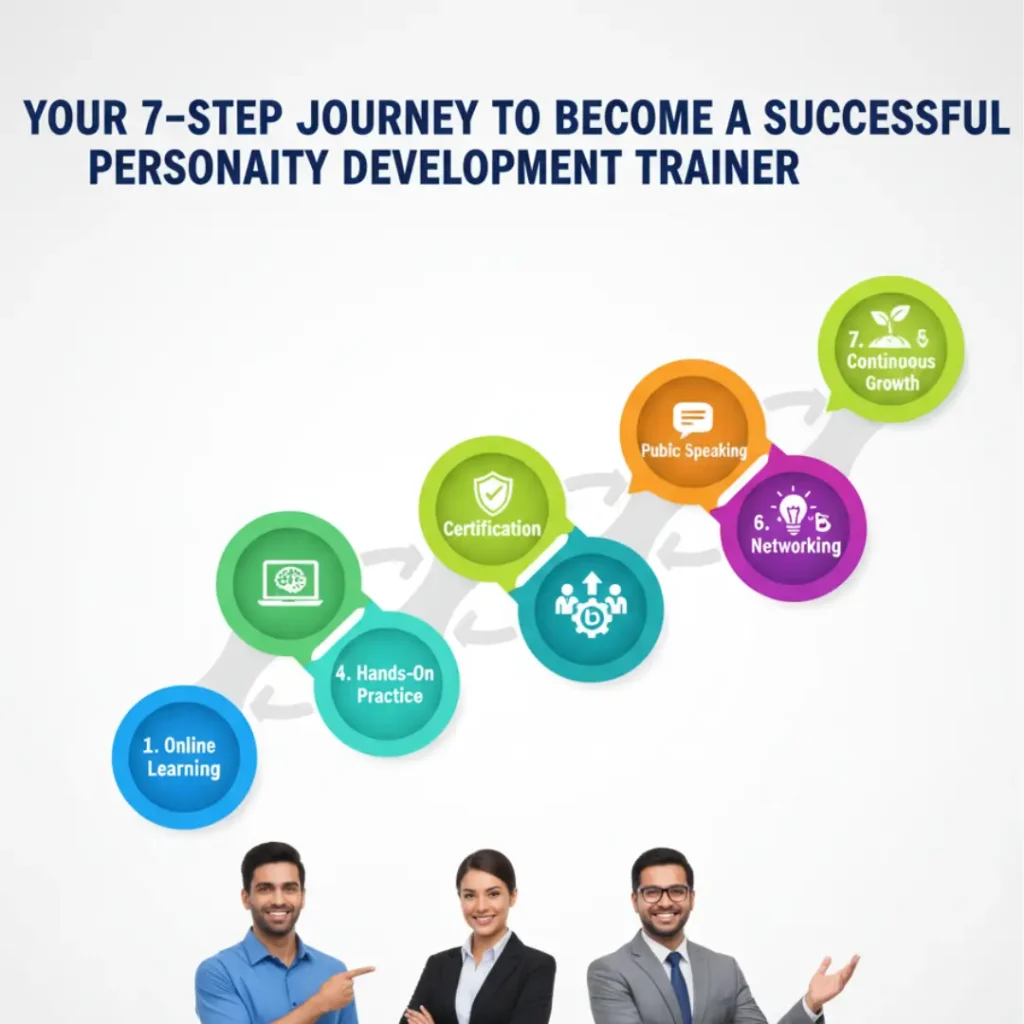Last updated on February 7th, 2026 at 02:50 pm
Have you ever felt really good after helping someone feel more confident or giving advice that actually helped them? If yes, then you are already on your way to becoming a personality development trainer. At personaguru.in, we believe everyone can grow and improve.
Today, I’ll show you how to become a trainer who teaches important skills like communication, confidence, and personal growth. Whether you want to help students, working professionals, or companies, this career lets you support others while building your own future. If that sounds exciting, keep reading!
Key Takeaways
- Passion Pays Off: Combine your love for helping others with certifications to earn $67K+ annually as a part-time trainer (ICF data).
- Practice Makes Pro: Log 100+ coaching hours to master your craft and build unshakable confidence.
- Brand Smart: A niche-focused website and free value (e.g., webinars) can convert 20-30% of leads into clients.
- Stay Ahead: Embrace trends like AI tools and virtual workshops to stand out in the $67B personal development market.
- Impact First: Every session you lead changes lives—start small, dream big!
.jpg) |
| How to Become a Personality Development Trainer |
Why This Field Is Growing So Fast
Personality development training is not just a trend. The world is changing quickly. People need soft skills, like teamwork, leadership, positive thinking, and public speaking, more than ever. The personal development industry is now worth over $51 billion, and it’s expected to reach $67 billion by 2030. Trainers are needed everywhere: schools, companies, online workshops, and even social media.
Main reasons for growth:
- Online learning: Workshops and classes are easy to attend from anywhere.
- Remote work: Companies want employees who communicate well and adapt quickly.
- Career changes: People want to improve their skills to get better jobs.
- Personal growth: More people care about self-improvement and mental health.
Read More- Improve Public Speaking
Qualities of a Good Personality Development Trainer
You don’t need to be perfect, but some qualities matter a lot:
- Genuine interest in people: If you enjoy listening, sharing, and helping, that’s a strong foundation.
- Good communication: Speak clearly, listen patiently, and explain things in a way anyone can understand.
- Empathy: Understand others’ feelings and challenges.
- Flexibility: Every person is unique. Be ready to change your style.
- Continuous learning: The best trainers keep learning themselves.
Story Example:
Anushka Rajesh, a popular soft skills coach in India, started by helping her classmates with presentations. She noticed she liked encouraging others and turned this into a full-time career.
Read More- Powerful Tips to Boost Your Emotional Intelligence
Step-by-Step: How to Become a Personality Development Trainer
1. Learn the Basics
Start with simple online courses on psychology, public speaking, body language, and emotional intelligence. Websites like Coursera, Udemy, and YouTube have affordable courses—many for under ₹1,000. Books like “Mindset” by Carol Dweck are also great.
Tips:
- Take a course when it’s on sale.
- Follow 5 trainers on LinkedIn or Instagram for ideas and inspiration.
2. Get Certified
A certificate gives you trust and credibility. Clients and HR managers prefer certified trainers. The International Coaching Federation (ICF) is the gold standard, but affordable options like Transformation Academy also work well.
Facts:
Certified coaches can earn 20-30% more than non-certified ones. Even a part-time coach in 2025 can earn $67,000 a year (ICF data).
If you are on a budget:
Start with free or low-cost courses, and upgrade later.
3. Improve Your Communication
Practice talking, listening, and giving feedback. Join Toastmasters or practice with friends. Record yourself and notice how you sound.
Pro tip:
Ask a friend to role-play a client. Give feedback, and ask for theirs.
Read More: Action Plan to Improve Communication Skills
4. Get Real Experience
Nothing beats practice. Offer free sessions to friends, family, or at local NGOs. Run a few online workshops—these can be on Zoom or even WhatsApp. Collect honest feedback.
Goal:
Try to coach at least 100 hours. This builds your portfolio and confidence.
5. Build Your Personal Brand
Choose a niche—maybe you love helping students, women returning to work, or people with stage fright. Make a simple website (WordPress is cheap) and share tips on Instagram or LinkedIn.
Tip:
Specialize early. For example: “Personality Development for College Students” or “Confidence Coaching for Working Moms.”
Read More: How to Build a Strong Personal Brand
6. Network and Connect
Join online groups, attend webinars, and introduce yourself to HR professionals or other trainers. Partnerships can lead to new clients.
Quick ideas:
- Offer a free consultation call.
- Guest post on someone’s blog or podcast.
7. Keep Improving
Every month, learn something new—like mindfulness, time management, or using AI tools for coaching. Ask your clients for feedback after every session.
Tips:
Add one skill per quarter (e.g., neurodiversity-inclusive coaching).
Survey clients post-session for improvements.
How to Plan a Great Session or Workshop
1. Know what your client wants:
Send a Google Form or simple message to ask about their biggest challenge.
2. Make it practical:
Start with a small task (like a 1-minute speech), and give real-life examples.
3. Use visuals:
Canva is great for making slides. Memes, pictures, or short videos keep things interesting.
4. Set goals:
Help your client set a simple, clear goal (like “I will speak up in the next meeting”).
5. Track progress:
Check in after 30 days. Celebrate small wins.
Pro Tip: Share anonymized client stories—like how Ravi overcame stage fright—to inspire trust.
How to Land Clients
No clients, no impact. Here’s your 2025 playbook:
Build a Website: Blog on “Overcome Public Speaking Fear” with keywords like personality development and confidence coach.
Offer Free Value: Create a “5-Day Confidence Booster”.
Social Media Shine: Share Instagram Reels, LinkedIn tips, or YouTube body language hacks.
Testimonials: Ask early clients for reviews.
Partner Up: Connect with schools or HR for workshops.
Final Thoughts
Becoming a personality development trainer is possible for anyone who is willing to learn, practice, and connect with people. Start small—help a friend, take a course, or run a free workshop. As you grow, so will your confidence and client list.
Remember:
Every small step counts. If you’re ready to help others, this is a meaningful and rewarding career.
Who will you help first? Take that step today!


